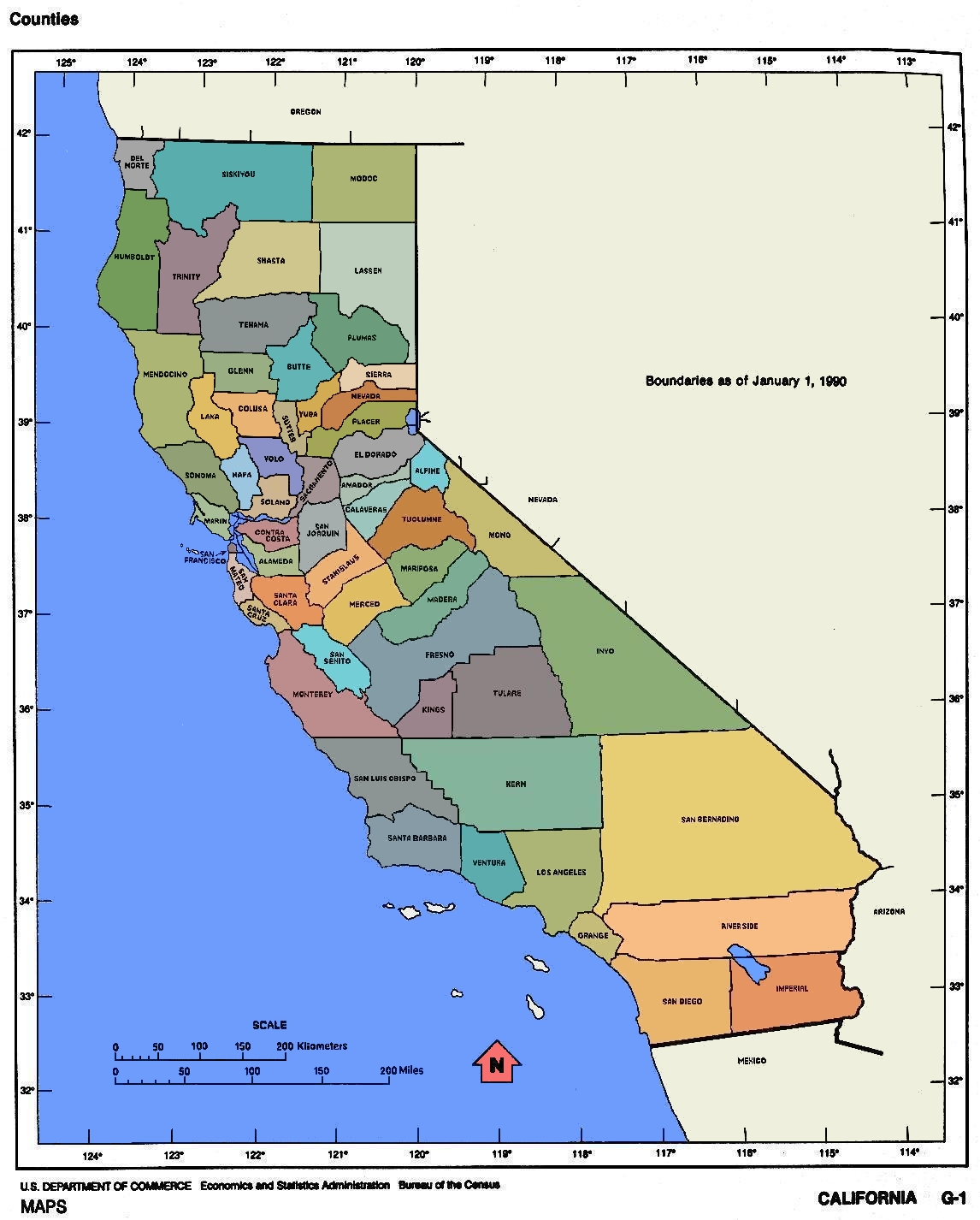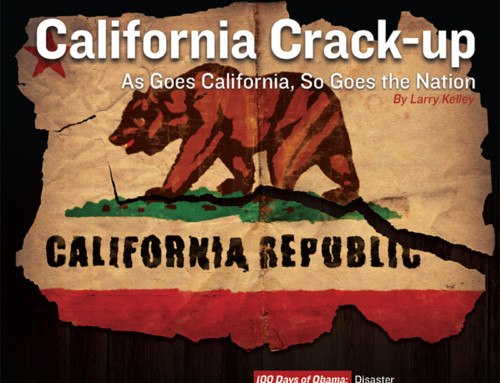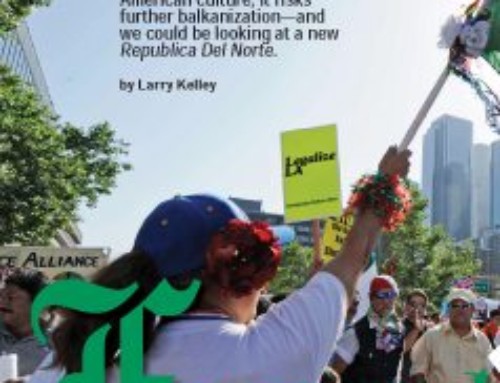Part One: Break the Gerrymander or Bust
In the 1830s, Alexis de Toqueville, coined an immortal phrase, the tyranny of the majority. While touring our young country, the French journalist and aristocrat became an enthusiast for the American experiment, yet he presciently warned that, like republics of antiquity, universal suffrage leads to the ‘public treasury being exhausted.” Modern translation: If enough Americans find a way to vote themselves a paycheck, the Republic is doomed.
The five-term U.S. congressman and Governor Schwarzenegger’s current Director of Finance, Tom Campbell, now openly attests that the treasury of the country’s largest state is very nearly exhausted. Although the state took in an awesome $84.5 billion (revenues for the last fiscal year) it has what Campbell calls a “structural deficit” of $5 billion and growing. Ominously, he makes it clear that our backs are against the wall. “We have nothing in the Budget Stabilization Account (the rainy-day reserve), and we’ve almost exhausted our existing authority to borrow.”
To understand how our elected officials could have legislated their way into this fiscal crisis, while awash in a tsunami of money, it’s important to note that despite our system of universal suffrage or perhaps because of it, California’s representative democracy is broken and failing all but those of its most favored financial backers. California’s legislature has an abysmal approval rating of just 27% which is roughly the percentage of Californians who are government employees, government pensioners, and activist members of the trial lawyers association, in short, those who are the chief donors to and the benefactors of the gerrymandered system. Angered by the peasant uprising which was the recall election of two years ago, the profligate legislature reacted by binging with the tax payers’ money. Outlays over the last 24 months have shot up by $22 billion or one-third! All other California constituencies who pick up the bingers tab, the entire private sector, from the utilities and oil companies to small business owners and farmers, from the commuters in LA to the inner-city parents of public school students, all of these are of no concern to the power brokers behind the system and their benefactors.
It is not hyperbole to say that the system of government now extant in California is no longer representative democracy but rather an oligarchic kleptocracy where the state’s enormous largess is systematically plundered to benefit the few. How did it happen that we are saddled with this tyranny of the minority? Answer: legalized scientific gerrymandering. If you believe that the voters in California, outside the favored elite, still have a voice in how much of their incomes are levied away in taxes or how those funds are spent, consider that in the last general election of 2004 not one seat of the 80 in the State Assembly, not one seat of the 20 in the State Senate, and not one seat of the 53 (national) Congressional seats changed party. As Tom Campbell put it, “This is all you need to know. Could it have happened by chance? No.” Clearly, the system is not just rigged. It’s completely rigged.
Among the voices that the Kleptocrats would no doubt like to silence are those of the Sacramento-based talk-radio duo, Armstrong and Getty, who manage to keep the highly rancorous political climate in Northern California entertaining and who are in the vanguard of the this new medium that some have described as to the twenty-first century version of the Athenian assembly where every soldier was a voting member. They recently explained to one of their callers why Governor Schwarzenegger’s redistricting proposition, 77, on the special election ballot this November, is tantamount to the restoration of democracy in California. (From a historical perspective, the special election itself is just that, an exercise in pure democracy, from the Greek, meaning—rule of the people. The initiative process circumvents the corrupt political class of representatives and puts the power back in the hands of the people as it was for the Athenian citizen soldiers during the fifth-century B.C.)
Armstrong explains, “The present system allows the legislators to draw their own districts. This means that both parties have a deal where they don’t have to spend time and money beating each other up, where they’ll never be defeated, and where they never have to answer to the stupid voters! They just worry about the activists and the special interests that write the checks! And this way, the only way they can be beaten is if someone comes in who is more left or right-wing than they are.”

This is why the state, currently run by the Democrat-dominated legislature, simply cannot control spending. The only liability that the gerrymandered legislators have is if they are seen as too moderate.
“If you are a candidate, and the party hierarchy, right or left, taps you on the shoulder,” Armstrong says, now on a roll, “and they (the power guys from the back room) tell you that you’re their man, you have no reason to respond to the voters. Screw them!”
Republican State Assemblyman, Kieth Richmond, reputed to be a moderate, “bridge builder,” and a regular guest on the show, concurs with the hosts, that the legislature of which he’s a member, is in a five-year-long self-imposed state of partisan gridlock. Speaking to the hosts by phone, he says, “Whether you talk about our passing bills that no one wants such as the last week’s driver’s licenses for illegals,… to our failure to fix the education system where half the state’s minorities drop out of high school, we are on a downhill slide.”
“Is the electorate going to wake up to just how dysfunctional this government is?” asks Getty.
“We’re going to have to. This is a global economy. China is the world’s leader in manufacturing. India is becoming the leader in information technology. But we (in the California legislature) are not investing in the infrastructure to be competitive, from broadband, to highways, to medical facilities, we’re failing.”
(California taxpayers might wonder—If the legislators are spending $85 billion a year and not investing in infrastructure needed for future job creation, what are they spending the money on?)
Assemblyman Richmond went on, “After the hurricane, we can’t even get a bill passed to shore up our own levies (on the Sacramento River). Instead, we’re scheduled to spend (in the 2005-6 fiscal year) $3.5 billion on state employee pensions. This is up from 2000-1, when we spent $160 million.”
(Over a five-year period, this represents a twenty-fold or 2,000 percent increase and begs the question—Are those future retirees at the DMV doing that much better a job?)
“And you see this not only at the State level but at the municipal level. The City of Bakersfield is spending 17% of its budget on retiree pension costs. We have school districts throughout the state which are not likely to remain in business due to high retiree costs.But we’re not going to get any of these problems addressed until we get fundamental reforms,” the Assemblyman concluded.
So then, why would Prop 77, the redistricting measure not pass? Answer: because the entire California Democrat machinery and the national Republican congressional leadership are both against it. (The measure allows for a panel of judges to redraw not only all state legislative districts but all the 53 congressional districts as well.)
The San Francisco Chronicle gleefully reported recently that the “strange bedfellows,” the ultra-liberal Democrat congressman from North Hollywood, Howard Berman, and the archconservative congressman from East Sacramento, Doolittle, have teamed up to persuade to persuade the Federal Election Commission in D.C. to allow them to raise unlimited soft money (from D.C. lobbyists) to defeat the measure.
Although Armstrong called Doolittle, on the air, a “coward-in-chief” and challenged him to a fist fight, fair and square in some Sacramento back alley, the Congressman’s office grudgingly agreed to book him for an interview the following day, this presumably so that the congressman could defend his craven assault on democracy.
As Secretary of the House Republican conference, Mr. Doolittle is considered one of the four or five most powerful members among the Republicans in congress and has an impeccable voting record from the viewpoint of conservative activist associations. After cursory opening pleasantries, Armstrong asks, “So why are you against Prop 77?
“Because it turns over redistricting from accountable elected officials to unaccountable retired judges, such as the 9th circuit court…” (The California court recently ruled to make the phrase under God not permissible in the public schools’ version of the pledge of allegiance.)
“Given that the California legislator has an approval rating in the twenties and no seats changed hands in the last election, doesn’t that suggest that the fix is in?” parries Armstrong.
“Look, let’s work together to elect good people,” Doolittle replied with a palpable aura of dejected resignation, “and not put in place forces that would cause us to lose our majority in the House of Representatives which I believe (would be) very dangerous to the country. And if you have to have redistricting, leave the House out of it. We only have to lose 15 seats for Nancy Pelosi to become Speaker of the House.”
California continues to exhibit its ability to generate political groundswells. There are reputedly grassroots redistricting measures circulating in Illinois, Michigan, and Florida while one has already qualified in Florida. According to Sacramento based political analyst, Gary Dietrich, “This is what has the Republican (House) leadership worried. They don’t want to risk the possibility that they’ll lose seats. Doolittle makes our case for us. This (initiative) is about California’s ubiquitous influence.”
A closed-to-the-media statewide Republican convention was held over the weekend of September 17 and 18, presumably to finalize battle plans for the seven weeks leading up to the special election on November 8. I spoke to Karen Hanretty, Spokesperson for the California Republican Party to find out if there were any “backroom” deals struck to cope with the Republican legislators who are happy with the gerrymandered system and with powerful opposition forces within the party, congressional magnates in D.C. such as Doolittle.
I asked her, “If prop 77 had left the congressional districts alone as Mr. Doolittle wants, would it have made it a safer bet that it will pass?”
“Here’s what Doolittle doesn’t seem to understand. The train’s already left the station, the initiative is on the ballot and the election will take place on November 8th.”
“Was it a mistake?”
“No, in the last redistricting process (2001) Loretta Sanchez who beat B-1 Bob Dornan (reputedly by 29 votes cast by the deceased parents of illegal aliens) and who actually admitted to the Orange County Register that she and most of her colleagues paid $20,000 each to Democrat consultants who were responsible for drawing lines that ensured they had safe seats…This is an abomination of democracy. The Republican party and the voters are sick and tired of politicians who choose their voters. Many now argue that it is not working at the legislative or the congressional level.”
“What are you going to do about Republican elected representatives who like the system because it makes their seats safe?”
“At our convention, one interesting backroom event occurred. The county Republican Chairmen’s Association voted to censure Congressman Doolittle. Then later after much discussion, they voted to rescind the censure in favor of strongly encouraging the Congressman to support the initiative,” she told me.”
“What does the censor mean?
“It’s a statement to Doolittle that there’s no support for his position among the (California) party leadership.”
In summary, one might conclude that Congressman Doolittle’s fears may be justified on one account—the loss of the Republican majority in the House of Representatives might tilt the authority for the defense of the country away from U.S. elected officials and toward our enemies on the U.N. Security Council. But what he does not seem to see, is that if we lose representative democracy, like Western Europe, we’re likely to be too bankrupt to meet our military’s payroll.
NOTE: Publication Human Events



